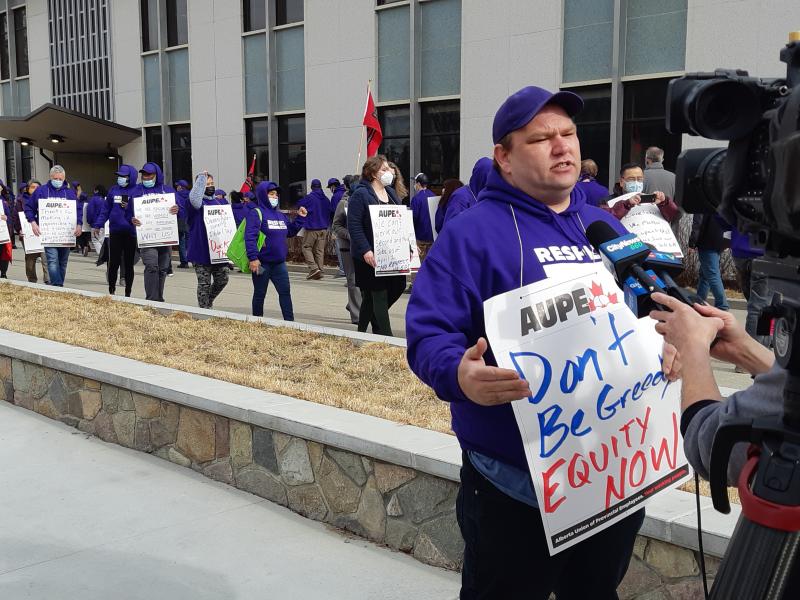AUPE Local 052 caretakers fight University of Calgary over exploitative wages and shift times
'We are at the bottom, and you are kicking us lower.'
May 19, 2022
By Shannon Carranco, Communications Staff
Dave Lamont has worked as a caretaker at The University of Calgary for five years. He was on the Projects Team, which was responsible for some of the harder caretaking work, like stripping and waxing the floors or cleaning the carpets. “You always knew what you were coming into,” Lamont said over a phone call.
Before the pandemic began, it was a feasible job. But in March 2020 the Projects Team became responsible for disinfecting all areas of the University that had been contaminated with COVID-19.
“If somebody had a case of COVID or a supposed case of COVID, we would show up in a full body hazmat suit and go into the office or the classroom,” Lamont said. “We got the N95 mask, we got the gloves, we got shoe covers. And then we got a big backpack full of chemicals and you spray down every touchable surface that you can get to, and then you wipe it all down after you're done spraying everything.”
Lamont was one of seven people who were responsible for disinfecting the University’s main campus, as well as the Spy Hill and Foothills campuses.
He makes $32,000 a year, but the University didn’t increase his wages when he and his team took on the COVID-19 cleaning tasks. They were also expected to carry out their original cleaning duties like stripping and waxing the floors. Lamont said the only reason he continued doing this work was because the Projects Team shift was from 10 PM to 6 AM, which meant they were entitled to an extra $2.50 an hour.
“It works out to about an extra $5,000 a year. That’s a big deal for somebody who's already at the bottom.”
"They’re at the bottom, they’re vulnerable workers, and their employer is kicking them even lower."

Blaming provincial budget cuts, the University of Calgary recently changed all caretaking shift times from five shifts to just two. They did this to avoid paying workers like Lamont the premium of $2.50 an hour. Caretakers already receive some of the lowest pay on campus, earning between $16 and $20 per hour. This change will affect over half of all caretakers and result in a substantial wage decrease.
It’s worth noting that the University’s 2022 budget is $1.4 billion and its President, Edward McCauley, currently makes $249 an hour.
“They’re at the bottom, they’re vulnerable workers, and their employer is kicking them even lower,” says AUPE vice-president Bobby-Joe Borodey.
Lamont said the work was so hard that he began having anxiety attacks on his way to the job.
“I was going to have a mental breakdown. I was shaking on my way to work because you just don't know what to expect. The project stuff was particularly difficult because you had no clue what the work you were going to be assigned that day was. So, I’d come in and they’d tell me [what my work was]. And I’d be like, ‘are you insane?’ And I would struggle to get it done. And sometimes you wouldn't get it done, and you would be dreading coming in the next day.”
Cutbacks for those at the bottom
In early April 2022, AUPE Local 052 caretakers of the University of Calgary delivered a letter to Dr. Malinda Smith, the Vice Provost of the Equity, Diversity and Inclusion [EDI], calling on the University to prioritize 200 of its most precariously employed workers.
The letter to Dr. Smith called out the University for institutional racism. While the University claims to be “committed to achieving equitable, diverse, inclusive and accessible employment practices and workplaces,” most caretakers are women, new immigrants, and people of colour.
The Office of Equity, Diversity and Inclusion (OEDI) “acknowledges and appreciates the intersection of social identities, systems oppression, and the discrimination connected to unequal distributions of power in general and those within university structures, hierarchies and power relations.”
"Considering that most caretakers are women of colour, cutting shifts and decreasing shift differentials for caretakers is a violation of the principles of Equity, Diversity and Inclusion at the University of Calgary," says Borodey.
Many members must work one or two more jobs on top of working at the University to make ends meet. These shift changes have impacted their other work, forcing some to quit their second or third jobs, leading to unnecessary severe financial hardship. Some caretakers are concerned about being able to get to work using public transit during these new hours. The first shift starts before 6 a.m. and the second shift ends at 9 p.m. These shift changes mean that most of the work is done during daytime hours when students are on campus; this has led to more contact between caretakers and students, increasing their risk of getting and spreading COVID-19.
About half of these jobs are not classified as full-time even though some caretakers are working full-time hours, preventing employees from accessing the benefits full-time workers are granted.
The University is also requiring caretakers to increase their cleaning ratio from 30,000 square feet to 35,000 square feet with no increase in hourly wage.
Lamont left the Project Team when the University took the $2.50 shift differential premium away. “Why would I keep doing the harder, more dangerous work when we're not getting any extra money or time off?”
Now he does regular caretaking work where he cleans sections of the University. He says it’s much more manageable than the disinfecting work he was doing before.
"Considering that most caretakers are women of colour, cutting shifts and decreasing shift differentials for caretakers is a violation of the principles of Equity, Diversity and Inclusion at the University of Calgary."